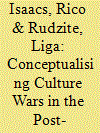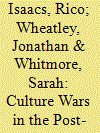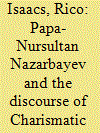|
|
|
Sort Order |
|
|
|
Items / Page
|
|
|
|
|
|
|
| Srl | Item |
| 1 |
ID:
180489


|
|
|
|
|
| Summary/Abstract |
This essay establishes a framework for analysing culture wars in the post-communist space. Using Latvia’s debate over the ratification of the Istanbul Convention on violence against women, it outlines the central features of culture wars: moralisation, externalisation of agency, the instrumentalisation of culture and the struggle for power and resources. While existing scholarship conceptualises culture wars as a dichotomous battle between the sacred and the secular, or between liberal and illiberal, our thematic analysis of the Istanbul Convention debate in Latvia finds it was less about culture and more a complex struggle between political and religious actors competing for power and resources.
|
|
|
|
|
|
|
|
|
|
|
|
|
|
|
|
| 2 |
ID:
180488


|
|
|
|
|
| Summary/Abstract |
In the last decade the term culture war has become hard to avoid. If it is not yet the buzzword of the first part of the twenty-first century, it soon will be. Culture wars seem to be around us everywhere. Each passing week brings some new mention of an outbreak in a public institution, civic space or political arena in some part of the globe. Culture wars are the phenomenon we cannot seem to shake. Battle lines are drawn, rhetorical tools are sharpened and social media awash with vitriol and moralising, and seemingly unbridgeable social gaps. If the immediate post-Cold War period did usher in an era of universal global liberalism, decades on it is now far in the distance, only visible in the rear-view mirror. Instead, around us lie social and political fault lines featuring competing visions of what should be the appropriate normative basis upon which societies should be constituted. They are debates that focus on belonging, on citizenship, on rights and identities.
|
|
|
|
|
|
|
|
|
|
|
|
|
|
|
|
| 3 |
ID:
163070


|
|
|
|
|
| Summary/Abstract |
Norm contestation by local actors has emerged in recent years as an explanation for the failure of norm diffusion. This article contributes to the literature on norm contestation by analysing how norms diffused by the Organisation for Security and Cooperation in Europe (OSCE) pertaining to election observation and free and fair voting are re-constituted and contested by domestic actors in Kazakhstan. The study contributes to the idea of ‘constitutive localisation’ by emphasising a more fundamental level of disagreement beyond just congruence between the diffused norm and local beliefs; by demonstrating contestation can occur in the later stages in the norm diffusion cycle; by focusing on the micro-politics of contestation by local actors involved in the implementation of diffused norms; and by revealing how norm contestation is not necessarily a process of emancipatory politics, but a strategic act to serve authoritarian consolidation. Utilising a four-fold framework, the analysis illustrates how norms, while initially accepted by Kazakhstani authorities, are reconstituted through political discourse and/or practice, creating the moment of contestation. While this contestation is instrumentalised by political elites for their own advantage, it also remains an important element of agency within a normative order which they had little previous control over.
|
|
|
|
|
|
|
|
|
|
|
|
|
|
|
|
| 4 |
ID:
122792


|
|
|
|
|
| Publication |
2013.
|
| Summary/Abstract |
As opposed to the current literature which argues that informal politics pervades formal institutions in Kazakhstan and Central Asia more widely, this article argues that Nur Otan, the political party of the President of Kazakhstan, acts as a formal institution to counter the instability generated by informal networks competing for access to political and economic resources. This is achieved by consolidating the political parties associated with these networks into Nur Otan and the synchronisation of the party and the state apparatus. However, the extent to which Nur Otan can provide this stabilising function in the long term is dependent upon regime dynamics.
|
|
|
|
|
|
|
|
|
|
|
|
|
|
|
|
| 5 |
ID:
104197


|
|
|
|
|
| Publication |
2010.
|
| Summary/Abstract |
Taking a critical perspective on the Weberian concept of charisma this article examines elite and citizen discourse regarding the perceived charismatic leadership and nation-building achievements of the post-Soviet president of Kazakhstan, Nursultan Nazarbayev. Using a number of ideal type features of charismatic leadership based on the typology developed by Roger Eatwell, the article argues that Nazarbayev's leadership does not fit neatly the concept of charisma. Rather, in this instance, Nazarbayev's perceived charismatic leadership as the father of the Kazakhstani nation, and the single politician capable of meeting the challenges of post-Soviet nation-building, is a constructed discursive force projected from above at the elite level, which resonates with public attitudes towards him at the societal level. Charisma represents a discursive mechanism that emphasises President Nazarbayev's centrality to the unity, prosperity, and stability of the nation. This charismatic discourse has aided Nazarbayev in consolidating his authoritarian regime and illustrates the existence of a distinct form of post-Soviet charisma.
|
|
|
|
|
|
|
|
|
|
|
|
|
|
|
|
|
|
|
|
|